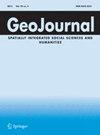The concept of quality of life and its application using the World Value Survey Wave 7: Slovak experience
IF 1.9
Q2 GEOGRAPHY
引用次数: 0
Abstract
Abstract The paper is focused on the spatial differentiation of the quality of life at a district level, drawing data from the World Value Survey Round 7 (2017–2022). Spatial quality of life research in the traditional sense is based on the premise that quality of life is experienced by the individual in a physical geographical space, and therefore the research focuses on the objective, spatial dimension of quality of life, measured using the objective indicators, usually from statistical sources. The novelty of the paper lies in the premise that a spatial investigation of the subjective dimension of quality of life is also possible, focusing on the question of where people are satisfied with their lives. The indicator of this dimension is a self-related evaluation, obtained using the face-to-face method or the internet. In the case of the World Value Survey 7, data collection was done using the Computer-Assisted Personal Interviewing (CAPI) technique. The aim of the paper is to conceptualize the subjective dimension of quality of life, apply the concept using data from WVS 7 and to find out which of the selected variables—also contained in WVS 7—are predictors of quality of life.生活质量的概念及其在世界价值调查浪潮7中的应用:斯洛伐克的经验
本文利用世界价值调查第七轮(2017-2022)的数据,重点研究了地区生活质量的空间分异。传统意义上的空间生活质量研究是以个人在自然地理空间中体验生活质量为前提的,因此研究的重点是生活质量的客观空间维度,使用客观指标(通常来自统计来源)进行测量。这篇论文的新颖之处在于,它的前提是对生活质量的主观维度进行空间调查也是可能的,重点关注人们对生活满意的问题。这个维度的指标是一个自我相关的评价,通过面对面的方法或互联网获得。在世界价值调查7中,数据收集是使用计算机辅助个人访谈(CAPI)技术完成的。本文的目的是概念化生活质量的主观维度,使用WVS 7的数据应用这一概念,并找出哪些选定的变量(也包含在WVS 7中)是生活质量的预测因子。
本文章由计算机程序翻译,如有差异,请以英文原文为准。
求助全文
约1分钟内获得全文
求助全文
来源期刊

GEOJOURNAL
GEOGRAPHY-
CiteScore
4.90
自引率
7.40%
发文量
228
期刊介绍:
Aims & ScopeGeoJournal is an international journal devoted to all branches of spatially integrated social sciences and humanities. This long standing journal is committed to publishing cutting-edge, innovative, original and timely research from around the world and across the whole spectrum of social sciences and humanities that have an explicit geographical/spatial component, in particular in GeoJournal’s six major areas:- Economic and Development Geography- Social and Political Geography- Cultural and Historical Geography- Health and Medical Geography- Environmental Geography and Sustainable Development - Legal/Ethical Geography and Policy
In addition to research papers GeoJournal publishes reviews as well as shorter articles in the form of research notes, commentaries, and reports. Submissions should demonstrate original and substantive contributions to social science and humanities from a geographical perspective. Submissions on emerging new fields such as GeoEthics, Neogeography, Digital Humanities and other emerging topics are also welcome.
GeoJournal’s focus makes the journal essential reading for human geographers working in these areas, as well as for researchers from other disciplines, such as sociology, economics, political science, demography, environmental studies, urban planning, history, and cultural studies.
Last but not least, GeoJournal encourages feedbacks and discussions on articles published in the journal through letters to the editor.
GeoJournal is published bi-monthly in February, April, June, August, October and December.
 求助内容:
求助内容: 应助结果提醒方式:
应助结果提醒方式:


